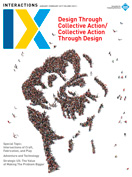Authors:
Katherine Isbister
How do we create wearable computing that truly augments everyday in-person social interaction? In my research group, we are using playful prototypes to tackle this question. Why are we studying games and play? Playgrounds have long been a place for social pleasures and also for working out conflicts among children through rich social encounters [1]. Play advocates and designers such as Bernie DeKoven have demonstrated that we can engineer social experiences between grownups through play, bringing them closer and encouraging collaboration and connection [2]. DeKoven has an extensive list of "othergames" on his website that are designed to create…
You must be a member of SIGCHI, a subscriber to ACM's Digital Library, or an interactions subscriber to read the full text of this article.
GET ACCESS
Join ACM SIGCHIIn addition to all of the professional benefits of being a SIGCHI member, members get full access to interactions online content and receive the print version of the magazine bimonthly.
Subscribe to the ACM Digital Library
Get access to all interactions content online and the entire archive of ACM publications dating back to 1954. (Please check with your institution to see if it already has a subscription.)
Subscribe to interactions
Get full access to interactions online content and receive the print version of the magazine bimonthly.






